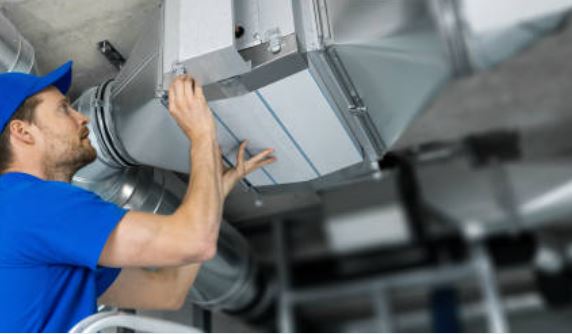Central air conditioner covers for outside units are essential. Check out HVAC Santa Clarita thought on this subject.

During summer, the AC unit covers can prevent extreme heat from reducing your AC’s efficiency.
However, some believe covering an AC can do more harm than good. So, are their reservations justified?

call 661-888-0248
Contact us 24/7 for HVAC services!
Air Conditioning Service Santa Clarita >>>
Emergency AC Repair Santa Clarita>>>
AC Installation Santa Clarita >>>
It might be tricky to determine whether or not to use an air conditioner cover, and there is no clear answer.
The ideal thing to do would be to assess the merits and demerits of using an air conditioner cover before making an informed decision.
In this article, we examine whether outdoor air conditioners require an added layer of protection or not.
Read on to learn more.
Should You Cover the Outdoor Unit of Your Air Conditioner?
Some residential HVAC contractors think that an AC cover is unnecessary. Outdoor units are engineered to resist all weather conditions. While contemporary air conditioners are incredibly effective and long-lasting, covering your outdoor AC unit may be handy in particular situations.

Extreme weather and temperatures accelerate the wear and tear on your air conditioner. This, in turn, hinders your air conditioner from functioning correctly and may result in increased utility costs.
It’s a great idea to always cover your air conditioner in the autumn. The wind that results in trees’ shedding process and transport leaves and twigs to your air conditioner. These organic elements may accumulate in your HVAC system and disrupt its operation.
They may also block your drain system, causing it to malfunction when you use your AC unit the following season.
Furthermore, while your air conditioner’s outside unit is not in use during the winter, you may cover it from dust and debris to preserve it in excellent working order. If dirt accumulates on the outside unit, it will be sucked in when you turn on the air conditioner in the summer, clogging the drainage or the air filters.
Dirty filters may significantly impact the quality of your indoor air and the effectiveness of air conditioning equipment.
Risks Associated With Selecting an Air Conditioner Cover
Although covering an air conditioner is a viable solution in certain situations, it cannot give complete protection. There are several risks involved:
Mold & Mildew Growth
Moisture is unavoidable and can infiltrate into the unit to some degree (even with a cover). This is because it is propelled by wind and can get trapped. This may result in mold growth and rapid corrosion.

Mildew development may obstruct HVAC airflow and cause the condenser to malfunction. Furthermore, mold and mildew may quickly permeate your house, affecting indoor air quality.
Picking a breathable cover through detailed buying guides can help you tackle this problem.
Pest Infiltration
Covering your HVAC unit might also bring unwanted visitors such as bugs and mice. Birds may also build a nest in your AC, especially during the winter.

In cold seasons, birds become desperate for refuge and might find it in your well-guarded AC unit.
Mice may gnaw the cables and build a nest within the device. The damage caused could result in pricey repairs and services.
However, you can avoid these issues by only covering your outdoor AC unit during the fall. At this period, twigs and dirt will most likely penetrate your unit.
Also, if your neighborhood does not receive severe winter storms, covering your unit’s top only can work.
Generally, the climate plays a massive role in whether your outdoor unit requires an AC cover. The kind of cover you select can significantly help mitigate the adverse effects.
Factors to Consider When Choosing the Best AC Outdoor Unit Cover
People seeking to preserve their new outside AC unit equipment may put a plastic or rubber cover. However, this might overwhelm your unit and do more damage than good. The work of an AC cover is to keep your AC in top form for the next season.
But, a cover is only helpful if it’s the right one. These are some essential factors that will help you make the right decision:
Waterproof Central AC Cover
Since moisture is the main cause of many problems(1), it’s best to use a waterproof cover that prevents water from leaking. It will ensure that moisture is not trapped within and will stop mold formation.
Central Air Conditioner Cover Size
The cover size should correspond to that of your outdoor unit. This is why measuring your AC’s dimensions is essential before buying a cover. Select a cover with the closest specifications if your measurements aren’t listed.
Furthermore, select a cover that’s somewhat less than your AC. You don’t want rodents to hide behind a cover because it’s not a secure fit.
Breathable Fabric

Don’t protect your air conditioner with plastic. You’ll kill your air conditioner. Covers consisting of permeable and porous fabric that permits air circulation, such as mesh, should be used instead.
This increases ventilation while preventing moisture from entering.
Cover Durability
Opt for a durable material like woven polyester or PVC when purchasing a cover. They are incredibly durable and can withstand horrid conditions.
Ease of Installation

An AC cover should be easy to put on and firmly attached to the AC. Padded handles, for example, are straightforward to put on and take off while not in use.
Additionally, check for plastic hems that will keep the cover in place and prevent it from being blown away by strong winds.
Warranty
An AC cover should have a warranty to survive many seasons. Opt for manufacturers that provide a minimum 2-year warranty.
UV Protection
An outdoor AC cover shielding the unit against UV radiation will minimize fading and brittleness over time.
Shelters & Coverings
You don’t have to cover the whole unit if you only want to protect your AC from direct snowfall. You may cover it with plywood. Alternatively, you can mount a shelter attached to your house that covers large parts of your unit.
This way, you can avoid putting on a cover. But remember that you still need to safeguard your AC and equip it for the winter.
How to Cover Your AC Unit Properly
Always cover your AC unit correctly if you opt to safeguard it during the fall. You can purchase a cover or make your own to save money.
If you decide to install it yourself, remember that the cover should only fall approximately 6 inches to the side of the unit. You don’t want to cover the entire air conditioner since it might cause difficulties like trapping moisture inside and producing rust.
You can leave it uncovered and take your chances in such a scenario. If you would need advice on buying one, feel free to reach out to us at HVAC Santa Clarita. We will professionally advise you on forced air vs central air outside covers.
Where Can You Buy a Central AC Cover?
If you want to buy a factory-made cover, you have endless possibilities. Your local home improvement shop will likely have an extensive range of coverings.
You can also purchase the covers online from a trustworthy provider.
Many AC manufacturers also supply covers alongside their products. In fact, you may have one mainly made for your unit somewhere in your house.
Central Air Conditioner Cover for Outside Unit Frequently Asked Questions
We answer some FAQs to help you decide whether you need a cover for your AC or not. If you need help selecting a cover for your air conditioner cover for outside, feel free to reach out to us.
Should You Cover Your Outdoor AC Unit During the Winter?
Generally, outdoor AC units are designed to withstand harsh winter conditions. However, a cover can protect against debris and damage if its fabric promotes sufficient airflow. They also prevent damage and the need for a local emergency AC repair.
How do I Prevent Ice Formation on My Air Conditioner?
- Have an HVAC expert regularly examine your AC’s refrigerant charge, and be on the lookout for any refrigerant leaks.
- Ensure your condenser coils and evaporator are free of any debris, dust, or dirt that could facilitate airflow blockages.
Are Covers good for outside air conditioners?
They are. However, they have their pros and cons. They will protect your system from harsh weather and keep it in good working conditions. On the other hand, the covers are an attractive perching place for rodents and birds.
If you live somewhere with extreme weather conditions, we advise you to get an air conditioner cover.
Final Thoughts on Central Air Conditioner Covers for Outside Units
We are calling it a wrap for central air conditioner covers for outside.
We are assured that you understand the pros and cons of covering your air conditioner.
It is now up to you to decide whether to use an air conditioner outside cover or not. Analyze the risks of not having it in comparison to your climatic conditions. You can then decide if it is worth taking the risk or not.
Remember that a cover will only serve its the purpose if it is the right cover. Therefore, ensure you get the best cover for your central AC.

call 661-888-0248
Contact us 24/7 for HVAC services!
Our Address is
HVAC Santa Clarita
26893 Bouquet Canyon Rd
Santa Clarita CA 91350
Opening hours
Monday 8 am – 8 pm
Tuesday 8 am – 8 pm
Wednesday 8 am – 8 pm
Thursday 8 am – 8 pm
Friday 8 am – 8 pm
Saturday 8 am – 8 pm
Sunday 9 am – 5 pm
How to Choose Centra AC Unit >>>
